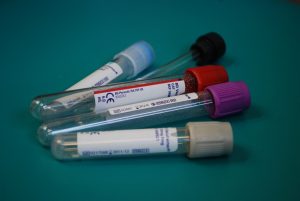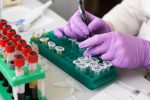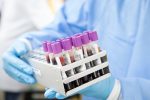
Page Navigation
- What Does a Typical Day on the Job Look Like?
- Typical Daily Duties
- Hours of a Phlebotomist
- Senior (a.k.a. Supervisory or Lead) Phlebotomist Jobs
- Phlebotomy Job Descriptions by Type, Location, or Specialty
- How Does Being a Phlebotomist Compare to Being a Nurse?
- How Many Parts of Full-Time Phlebotomy Jobs are Available?
- What Personality Traits Are Needed?
What Does a Typical Day on the Job Look Like?
If you have thought that a phlebotomist’s only requirement is to collect a patient’s blood, you are quite wrong.
Besides having this knowledge, he/she has to know how to work well with coworkers and computers.
Plus, a phlebotomist has to be skilled when working with people that are afraid of needles, including children.
Typical Daily Duties
If you take a look at daily phlebotomist tasks, they are so numerous but we decided to summarize some of the most frequent activities.
This can give you an idea of whether this is the job you think you can do.
- Draw and label blood samples
- Perform venipuncture and finger stick, from arterial, capillary, and venous locations.
- Collect and label urine samples
- Follow policies, regulatory guidelines, safety, and cGMP
- Register patients and keep patient records
- Check patient records for accuracy
- Perform donor physical exams including temperature, blood pressure, Hgb/Hct, and pulse.
- Know how to deal with negative reactions, hematomas, or injuries
- Work under supervision
- Maintain a clean and healthy work environment and work area.
- Monitor storage and inventory of supplies
- Label specimens and properly send them to laboratories as needed
- Have general computer knowledge and data entry
- Maintain patient files
- Greet, and communicate with patients
Do not get confused if your employer requires more office duties to perform such as scheduling appointments.
Also, a phlebotomist’s typical office job requirements are a positive professional attitude, great communicational skills, and cooperation with others.
Furthermore, many employers will require a drug-free workplace, so you may be asked to be tested for drugs.
Hours of a Phlebotomist
It cannot be exactly stated, but some of the phlebotomist’s jobs include working hours from 9 to 5, such as dedicated lab, plasma donation, clinic, etc.
On the other hand, phlebotomists working in hospital positions work during weekends, evenings, and holidays.
So as to compensate for these additional hours, employers offer slightly higher pay.
Senior (a.k.a. Supervisory or Lead) Phlebotomist Jobs
Senior phlebotomist jobs pay more, being that they require more experience, accountability, and human management skills.
These are some common requirements:
- Collaborates with leadership
- Works to train phlebotomists within the job
- Provides leadership
- Present findings to management
- Maintain compliance with regulatory guidelines (e.g. OSHA, CLIA, cGMP )
- Supervises donor files and machine logs
- Operates and maintains the automated plasmapheresis machines
- Supervise donor reactions
- Monitor and maintain inventories
According to the statistics offered by Indeed, it is estimated that most paid phlebotomists earn $30k, while those in expensive cities like California, Texas, and New York earn more than $50k.
Phlebotomy Job Descriptions by Type, Location, or Specialty
As we have already mentioned, what kind of duties a phlebotomist will have depends a lot on the type of work they are doing and which facility they are working in.
Plasma Center or Blood Bank
At Plasma Center or Blood Bank, a phlebotomist will be doing a regular phlebotomist job.
However, there are some common variations that make this job different from the one at the hospital or clinic:
- Interview donors to see if they will be good candidates
- Determine whether a person is or is not allowed to donate even though he/she wants to.
- Notice signs of anxiety, illness, fatigue
- Use interviewing skills to get honest and complete answers from donors.
- This is a little more demanding than a regular blood draw.
- Discuss any abnormal findings with patients found in their medical history.
- Respond to donor questions without giving medical advice
- Help with recruiting and retaining donors
- Maintain confidentiality
- Wear appropriate attire
- Have good grooming standards.
Hospital
When hospital jobs are in question, there is almost no variation.
There is a requirement to be able to work with difficult blood draws.
Lab
There are two types – a blood draw lab, and a processing lab.
Have in mind the fact that the processing labs require more training than a standard phlebotomist.
Traveling, Mobile, or Floater Phlebotomist
Traveling, mobile, or floater phlebotomist all means the same, a phlebotomist whose part of daily routine is traveling.
So as to be able to perform this job, you will need a valid driver’s license, and sometimes a vehicle.
This is needed if you have to travel and the employer does not provide you with a company car.
Traveling can involve either moving between different facilities within an organization, traveling between blood drive stations and between hospitals.
You have to know that this job includes overnight travel as well.
When it comes to payment, it is sometimes on a per case basis – $15 – $42.
This means that you are getting paid for your productivity, and not just to show up.
Outpatient Phlebotomist
You can also become an outpatient phlebotomist, meaning that you provide care that is not in a hospital.
This can include working in clinics, doctor offices, plasma centers, senior centers, and even surgical centers where the patient is not staying overnight.
Forensic Phlebotomist
A forensic phlebotomist works with law enforcement.
His/her duty is to collect samples from suspects which will be later on used as evidence, in criminal court cases.
Those samples will be used to prove major crimes of assault and homicide.
As a forensic phlebotomist, you will often be “on call.”
Phlebotomy jobs can also be located in places such as
- nursing homes,
- long term care centers,
- drug rehab centers,
- psychiatric facilities,
- mental retardation facilities
How Does Being a Phlebotomist Compare to Being a Nurse?
Even though many phlebotomy skills fall under the job of a nurse, it is worth mentioning that becoming a nurse requires far more training, as nurses have a lot more variety in their duties.
When their training is compared to a phlebotomist’s, a nurse is definitely going to have numerous types of illnesses and diseases to work with, unlike a phlebotomist whose main duty is to draw blood all day.
How Many Parts of Full-Time Phlebotomy Jobs are Available?
An analysis using Indeed, from over 10,000 jobs, results in this breakdown.
Phlebotomy Jobs by Type (or Term)
- Full time 74%
- Part-time 20%
- Temporary 3%
- Contract 3%
It can be concluded that there is a great amount of full and part-time positions available, as well as a few temporary and contract jobs.
What Personality Traits Are Needed?
So as to make you familiar with what the most common requirements are, we decided to take a look at LabCorp requirements, being that it is one of the largest blood draw labs in the USA.
You can check out the traits below (scale of 1 – 10) and determine whether you have the right combination of talents for this job.
- Adaptable 7
- Compassionate 10
- Collaborative 8
- Detail-oriented 7
- Patient 8
- Quick-thinking 7
Additional Recommended Traits
- Positive
- Trustworthy
- Fast-paced
- Multitasker
- Assertive
Those who do not possess these traits naturally should remember that:
- These traits are only needed while on the job, you do not need to have them at home.
- They are usually not required traits but just suggested.
- Many people do have all of these skills at the desired target levels but become excellent phlebotomists
- If you invest enough effort and training, you can learn and improve many of these skills.
We need to emphasize the fact that the most important skill is to be compassionate.
This means that you need to be a person who will be understanding of the patient’s needs, concerns, and pain.
Phlebotomists frequently deal with patients that are nervous and terrified about getting a needle in their arm.
So, they need to know how to calm the patients down and make them feel relaxed.
If you are not compassionate, Labcorp may not be the best place for you, but still, there are other facilities that hire phlebotomists that do not have to possess all the above-mentioned traits.








